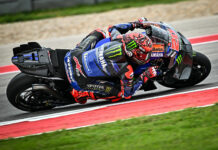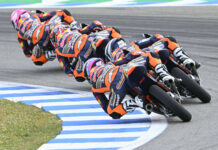VP STATES POSITION ON SUPERCROSS FUEL PENALTY, CALLS FOR AMA RULES CHANGE SAN ANTONIO, TX — Steve Burns, director of research and development for VP Racing Fuels, issued the following statement regarding the penalization of Ricky Carmichael for the San Diego Supercross race due to a fuel violation: VP Racing Fuels is a supplier to Team Honda, Yamaha, Kawasaki, Suzuki and KTM and has been involved in supplying fuel to professional motocross teams for 25 years. VP develops and manufactures fuels for both motocross and road racing for all these teams. In business since 1975, VP is the Official Racing Fuels of NHRA, the largest racing sanctioning body in the world, as well as a sponsor of more than 30 other racing associations in various capacities. VP produces more blends of racing fuels for unique applications than anyone else in the world. We like to think we have more technology in racing fuels than any other company. This is illustrated by the fact that in racing venues that do not have a spec fuel rule, more championships are won by VP-powered engines than any other fuel company. VP has earned its reputation as a world leader in racing fuels. It’s with great dismay that we learned of the latest incident regarding a points deduction due to a fuel violation at the Supercross race in San Diego. The matter is still being investigated and the jury is still out regarding the source of lead found in Ricky Carmichael’s fuel. Unfortunately, this marks the third time in the past three years one of AMA’s biggest stars was disqualified due to a situation of the AMA’s own making. The failure here is not the fault of the teams nor the fuel producer. The failure stems from a rule written to serve European interests. These disqualifications have also embarrassed three major corporations, essentially accusing them of cheating — violating a rule that is poorly written, based on a specification of .005 grams per liter set by the FIM for European competition, while the USA EPA limit is set at .013 grams per liter. These lead levels are so low they could not have affected the performance or octane of the fuel, nor could it have any effect on the outcome of the race. Significantly, VP has never been contacted by the AMA prior to the implementation of any rule pertaining to fuels which is very surprising given that VP supplies all the factory teams! The specification that needs immediate attention is the lead level. Based on the European limit, it translates to trace levels — parts per billion. The low limits set for lead in street fuels is to protect the catalytic converter from becoming coated over long term exposure, thus reducing the function of the converter. It is not a limit set for health reasons. Racing needs a wider tolerance for lead as the fuel is handled more frequently by more parties than pump fuels and in a more hostile environment. While pump gas typically goes from the manufacturer via pipeline or tanker to the gas station, then directly into the customer’s tank, racing fuel is typically shipped to the teams in drums, which are then opened for various purposes, e.g. to draw samples, run tests, transfer to smaller containers, dispensed into the vehicle, drained from the vehicle after the race for reuse, etc. The fact is all dirt contains lead in varying degrees and it is entirely possible that fuel could become contaiminated with trace levels of lead given the windy, dusty and dirty environment encountered at most race tracks. Significantly, none of the levels we are talking about have any affect on the fuel or its performance in the engine. The use of lead in racing fuels is allowed by the EPA Clean Air Act. There are no legal reasons for the elimination of lead from racing fuels. The other area of concern is the oxygen content of the fuels. As the rule is written, it would render many pump fuels illegal for use in AMA Pro Racing. The current AMA limit is 2.8%, while pump gas can have up to 3.7% in certain parts of the country. According to past conversations with Rob King, former AMA technical director, the current rules originally were written to ensure U.S. pump fuels would be legal for AMA Pro competition. The current rules fail that reasoning on both lead level and oxygen content. These problems do not need to be confronted again. They require an easy fix — rewrite the rules, while maintaining their intent. Suggestions were made to the AMA to this effect after the incident with Yamaha in 2004 but it fell on deaf ears. This is the third time the current rules have disqualified a racer that in no way was cheating or possessed an unfair advantage. It has made Yamaha, Kawasaki and now Suzuki look like cheaters, and made VP Racing Fuels appear incompetent. Yet, despite the recent claim by AMA’s Steve Whitelock that the problem “was explained away” in the earlier incidents, an analyzation of the facts in both incidents led to total exoneration of VP by the teams affected and all others involved. We anticipate the same will also be true when all the facts in the current case are analyzed. This whole situation is damaging to the health of AMA racing. It has cost the factories, the AMA, the racers, VP Racing Fuels and the fans wasted money, wasted time and misplaced emotions. It is time for the AMA to revise its fuel rules to reflect reality. More, from a press release issued by AMA Pro Racing: AMA PRO RACING TO INVESTIGATE FUEL SITUATION PICKERINGTON, Ohio – AMA Pro Racing announced that it will launch a special investigation into the fuel situation surrounding the Amp’d Mobile AMA Supercross Series. On Friday, Feb. 24, Ricky Carmichael was penalized 25 points for using illegal fuel at round six of the series at Qualcomm Stadium in San Diego, Calif., on Feb. 11. As part of a routine post race technical inspection at the end of the San Diego event, the fuel from Carmichael’s motorcycle, along with seven others, was tested. The fuel from Carmichael’s motorcycle was found to be out of compliance with the rules and the Team Makita Suzuki rider was assessed a 25 point penalty. The fuel from the other seven competitor’s motorcycles was determined to be within the rules. The list of riders whose fuel was tested includes Mike Alessi, Grant Langston, Jeremy McGrath, Nate Ramsey, Chad Reed, Andrew Short and James Stewart. AMA Pro Racing has required the use of unleaded fuel in AMA Supercross and AMA Motocross competition since the 2004 racing season. In making the announcement that a special investigation will be launched, AMA CEO Patti DiPietro noted that while a fuel penalty is not an appealable offense, there is enough evidence in this case to warrant an investigation. “Our goal here is to get to the bottom of this ongoing fuel situation,” said DiPietro. “The rule on unleaded fuel is clear cut. If the lead content in fuel exceeds 0.005 g/l (grams per litre) it is illegal for competition. This is an objective, easily defined measurement that has been in place for three racing seasons. What concerns us here is that we keep finding fuel that is outside of the rule limits. We expect our competitors to take every possible step to ensure that their equipment is completely within the limits of the rules, but to penalize a competitor for an offense that is completely beyond his or his team’s control is not our purpose. “Furthermore, it is not our intention to have a ruling influence the outcome of the series unless completely and absolutely warranted. This investigation will objectively determine all of the facts surrounding this issue.” DiPietro stated that an outside consultant will be contracted to conduct the investigation. It is expected that teams as well as fuel suppliers, among others, will be interviewed in this process. The finding and recommendations of the consultant will be the foundation for any further action to be taken by AMA Pro Racing officials. Until the outcome of the investigation is determined, Carmichael’s penalty stands. More, from another press release issued by AMA Pro Racing: AMA/FIM REACH RESOLUTION ON CARMICHAEL PENALTY PICKERINGTON, Ohio (March 3, 2006) –The American Motorcyclist Association (AMA) and the Federation Internationale de Motocyclisme (FIM) have announced a joint resolution to the points penalty imposed by the AMA on Ricky Carmichael following the February 11 San Diego round of the AMA Supercross Series and the FIM World Supercross GP. In a post-race tech inspection, the fuel in Carmichael’s motorcycle was found to contain more lead than allowed under a standard jointly adopted by both sanctioning bodies beginning with the 2004 racing season. The AMA has enforced that fuel regulation in its AMA Supercross Series and AMA Motocross Championship for the past two years. However, this is the first time that testing has revealed a fuel violation affecting a competitor entered in both the AMA and FIM series, and while the fuel standard is the same in both rule books, the two sanctioning bodies call for different testing protocols. The AMA initiated an investigation into the fuel requirement and testing protocols. It then became apparent that this difference in testing protocols would make consistent enforcement of this standard difficult, and the two sanctioning bodies have agreed to cooperate in the investigation, with the goal of creating a unified unleaded fuel standard and testing protocol for the 2007 season. Meanwhile, the AMA and the FIM jointly agreed that, because of the disparity in testing protocols, a points penalty would be inappropriate in this case. As a result, the AMA has rescinded the 25-point penalty imposed on Carmichael in the AMA Supercross Series standings, and the FIM has said that it will not impose a points penalty in the World Supercross GP standings. Both sanctioning bodies agreed, however, that a penalty is still appropriate for this fuel violation, and the decision was made to impose a $20,000 fine on the Suzuki team for which Carmichael rides. The AMA and the FIM will equitably donate the fine to the Asterisk Mobile Medical Center, which provides trackside medical support to riders at all AMA Supercross Series/FIM World Supercross GP series and AMA Motocross Championship events and to Riders for Health, a humanitarian organization working in Africa for 15 years reaching nearly 11 million people with regular health care workers riding motorcycles. “It was clear that the differences in testing protocols raised serious problems for enforcement of this rule,” said Steve Whitelock, AMA Motocross and Supercross Series manager. “We think this is a fair and equitable resolution of a difficult situation” said Wolfgang Srb, President of the FIM Motocross Commission. The AMA has announced that the fuel investigation will be conducted by the Southwest Research Institute’s Fuel and Lubricant Lab, an independent consulting organization with nearly 60 years of experience. It is expected that teams as well as fuel suppliers, among others, will be interviewed in this process.
© , Roadracing World Publishing, Inc.






